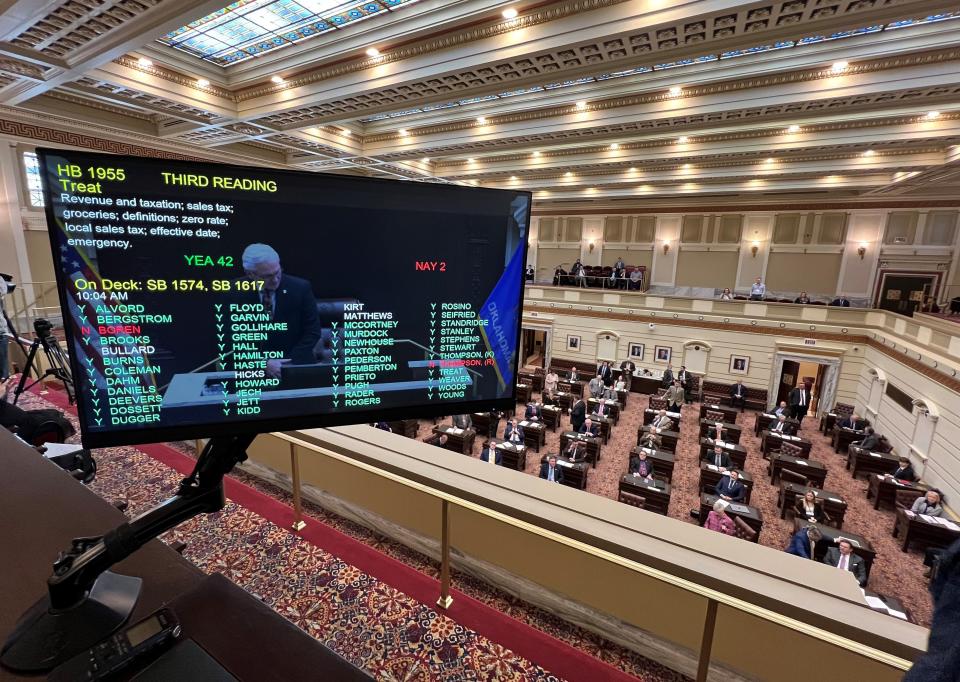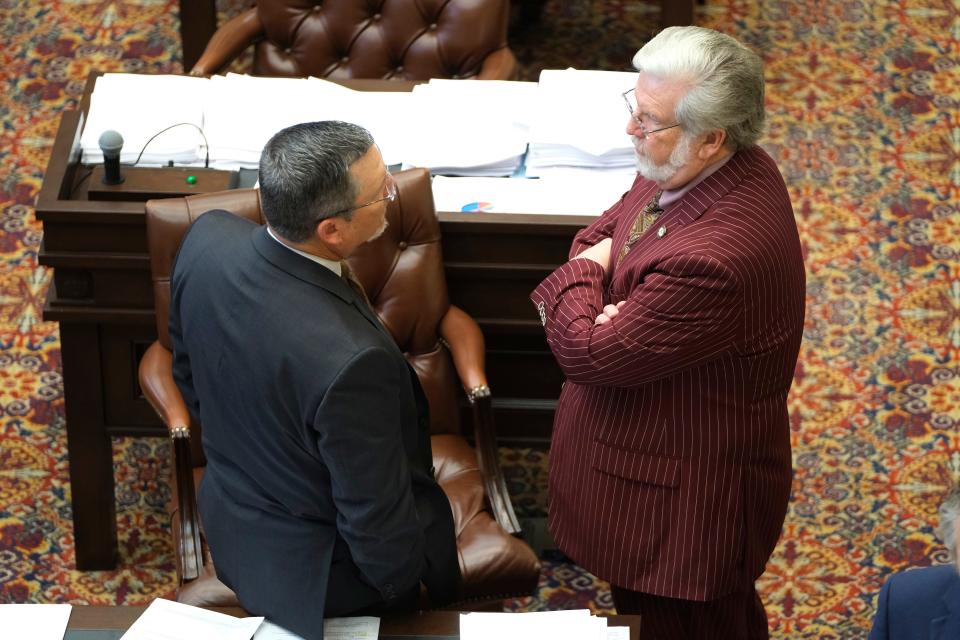OK Senate agrees with House to cut the grocery tax, and the bill now goes to the governor
- Oops!Something went wrong.Please try again later.
Late this summer you may pay a bit less at the grocery store.
Thursday morning the Oklahoma Senate voted 42 to 2 for a bill that eliminated the state's portion of the grocery sales tax — about 4.5%. That measure, House Bill 1955, originally cleared the House of Representatives last year but has remained stalled in the Senate since the end of the 2023 legislative session.
Senate Appropriations Chairman Roger Thompson, R-Okemah, and Sen. Mary Boren, D-Norman, voted no. Four members were absent and did not vote.
Though the Senate passed the bill, it didn't act on its emergency clause, which means the bill won't go into effect until 90 days after the session adjourns on May 31. The bill also contained language that prohibits cities and towns from increasing the taxes on groceries until June 30, 2025.
The vote sends HB 1955 to Gov. Kevin Stitt, who has said he would sign any tax cut bills that come across his desk. Thursday afternoon, the governor issued a media statement praising the vote.
"Today, we get to fulfill a promise to all four million Oklahomans and pass the largest single year tax cut in Oklahoma history. Cutting the grocery tax means relief for all Oklahomans," he said. "I’ve called for tax cuts since 2019, and in 2022 I called a special session specifically to cut the grocery tax. I want to thank Speaker (Charles) McCall and the House for tirelessly fighting for tax cuts, and to Pro Tem (Greg) Treat and the Senate for sending this to my desk."
More: Gov. Stitt says he would sign a grocery tax cut before an income tax cut

After the Thursday morning vote, Treat, R-Oklahoma City, said he was pleased the measure passed.
"I think the bipartisan nature of the vote showed the people of Oklahoma that we are listening," he said.
Treat said cutting the state's portion of the grocery sales tax would have the biggest impact on Oklahomans. He said estimates show that each person would save about $104 per person in taxes. Treat said the cut would cost about $312 million this year and $418 million for year.
Those costs, he said, would eat of most of the state's growth revenue. Treat said he expected most state agencies would see flat budgets for the year, though he added the Senate would feel comfortable spending about half of the $2 billion in unencumbered cash available for one-time need this year.
"We have the ability to make some critical investments," he said.
Tax cuts headline 2024 session
The debate on tax cuts has, so far, dominated the session.
Both McCall and Stitt have pushed for cuts to the personal income tax and the grocery sales tax and, at the same time, waged a game of legislative chess with the Senate. In what has become a blizzard of media statements and news conferences, the House and the governor's office have sought to paint the Senate as the group stalling progress on tax cut legislation.
Treat countered that the Senate would wait to see a report from the state Board of Equalization before it decided its next move. Thursday morning, Treat echoed those statements, speaking about why the Senate waited until now to move the bill.
"Thank you members for your patience on us, as a Senate body, the chamber that waits and makes sure that things are sustainable for the long term," he said. "I'm extremely proud to be the leader of this chamber that has not rushed into a decision, but yet studied it for nearly two years. I'm grateful for the countless hours of work, study, debate, disagreement and argument that came out of that."
Treat said the effort led him to the conclusion to adopt a tax cut on grocery tax because he believed "it does impact one of the most basic needs."
After the Senate vote, McCall issued a media statement calling the bill's passage "a truly historic day."
"With the passage of House Bill 1955, the Legislature has managed to give Oklahomans the largest single year tax cut in state history, returning $411 million to our citizens at a time when they need it the most," McCall said.

The Senate's action followed a long and contentious Republican caucus meeting Wednesday about how the group would approach tax cuts. Treat said his caucus discussed many ideas for tax cuts but ultimately settled on the grocery tax.
Treat also doubled down on his previous statements that the grocery tax cut would be the only tax cut heard by the Senate this session.
“To be clear — this is the only tax relief the Senate will be seeking this year," he said. "To ensure state services and recent critical investments in education and infrastructure remain intact in the long and short term, there is no way to do more at this time."
Still not every member of the Senate embraced the grocery tax cut idea. Thompson, the Senate's budget chief, opposed the cut. Thompson spent several minutes questioning Treat about the bill and, later, argued against its passage. He said tax cuts often look better on bumper stickers than on the state budget, but he stopped short of criticizing Treat, the bill's sponsor.
"I'm on record in a number of locations talking about relief and sales tax that it is a political move by many individuals. I've made the statement that it looks better or a campaign card or a bumper sticker," Thompson said. "So with the greatest respect that I have for the author of this bill and his belief in this bill — but because of our history and because of the needs of this state and because there is a preemptive clause that even prohibits the towns that are struggling (from) passing a sales tax for a year, I will be a 'no' on this bill today."
Democrats in Legislature fully supportive of grocery tax cut
Democrats in the House and Senate praised the bill. The Senate's minority leader, Kay Floyd, of Oklahoma City, said Democrats have "supported and continue to support cutting the state portion of the sales tax on groceries, giving relief to hard-working Oklahomans and their families."
Floyd said Democrats would continue to advocate for comprehensive tax reform that truly benefits those who need it most.
"We need a long-term structure that will give our citizens certainty about how those policies will impact their finances, as well as the critical functions of government Oklahomans rely on, such as public education, health, mental health, public safety, infrastructure and other vital services," she said.
In the House, Minority Leader Rep. Cindy Munson, D-Oklahoma City, said she, too, was pleased the Senate "has finally taken action on what we already know will help so many Oklahoma families."
"For the past several legislative sessions, including special sessions, the House Democratic Caucus has filed legislation to eliminate the state sales tax on groceries to provide immediate tax relief for working Oklahomans each time they go to the grocery store," Munson said in a media statement. "It has always been our priority — and will remain a priority — for us to protect our revenue base while also advocating for policies that will lower costs for Oklahoma families who need it the most. By eliminating the state sales tax on groceries, we are accomplishing a goal House Democrats have been working on and supported for many years.”
State lawmakers have until May 31 to finish their work.
This article originally appeared on Oklahoman: Oklahoma Senate passes grocery tax cut bill; Gov. Stitt expected to sign

